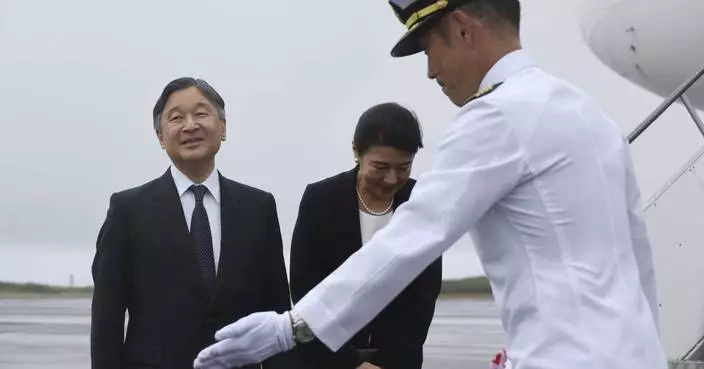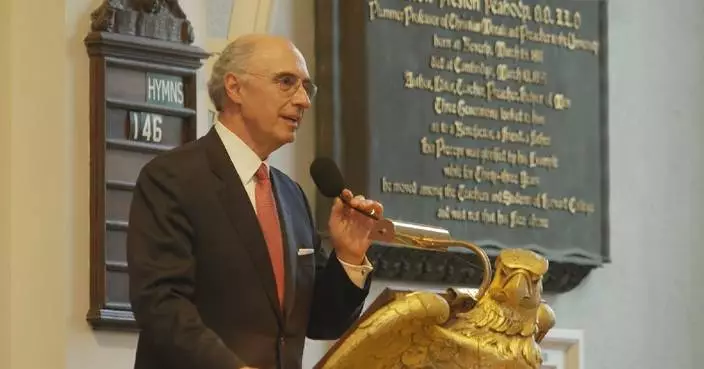Having it all means different things to everyone, but a rent-controlled apartment in Manhattan is probably pretty close to a universal dream — even for non-New Yorkers. It’s easy enough, then, to understand the profound conundrum facing Iris (Naomi Watts), a writer and professor who suddenly finds herself with a 150-pound Great Dane ward after an unexpected death in “The Friend.”
Not only is her place a mere 500 square feet, but it’s also one of those pesky buildings in which dogs are not welcome. Not even the cute, well-behaved ones.
Dog lovers may find the choice simple (perhaps it should be) and the apartment rules cruelly restrictive, but this is a single woman living a writer’s life in one of the most expensive cities in the world. And now she’s grappling with the idea of saying goodbye to a major part of her identity because her dear friend and mentor Walter (Bill Murray) died without leaving behind a plan for his beloved dog Apollo (Bing). Or perhaps that’s not entirely true: Iris was the plan. Walter just didn’t tell her that before he killed himself. She’s not even a self-proclaimed dog person.
The film is an adaptation of Sigrid Nunez’s National Book Award-winning novel of the same name, made by filmmaking duo Scott McGehee and David Siegel (“What Maisie Knew”). Its appeal isn’t mysterious — it's a classic New York movie about the most romantic New York profession, writing, with actors like Murray and Watts (and Bing) leading the charge.
These are characters who’ve lived lives, too. Walter died a celebrated but problematic author, known for his womanizing and multiple marriages. He left behind not just Apollo but three ex-wives (Carla Gugino, Constance Wu and Noma Dumezweni), a grown daughter (Sarah Pidgeon) not conceived in wedlock and a misconduct accusation. Iris and Walter also had a dalliance at one point, but settled into a friendship — his deepest, we’re told.
This is perhaps the most mysterious element of the story — partially on purpose, since Walter is dead for most of the movie. We see him only in limited flashbacks and Murray wears the part well: a freewheeling, egotistical genius whose ways have skipped out of sync with the times but whose charisma keeps him surrounded by throngs of admirers. And afterward, Iris is questioning what it all meant and perhaps how well she really did know this man: It's a kind of grief, that of a friend, that isn't regularly explored in films.
Iris is the most radical of female characters, even, depressingly in 2025: a single woman of a certain age and no ambition to be anything else. Watts plays her with grace and dignity, as she struggles with her own writing. Even Apollo has a past: Walter found him alone in Central Park one day and took him in as his own. When Walter's gone, Apollo is perhaps the most outwardly depressed about the loss. His days are spent either sitting sadly on Iris' bed with literal hangdog eyes or acting out and destroying things in her apartment.
It’s no spoiler to say that they’ll both have to go on a journey to realizing that perhaps they can find solace in one another in the devastating absence of their larger-than-life friend. McGehee and Siegel avoid hokey dog movie cliches and easy jokes about ownership learning curves and instead present a rather straightforward portrait of what it’s like to suddenly inherit a very large living creature.
“The Friend” stretches on a bit too long, but it’s done with such care and a kind heart that it’s not hard to give it two hours of your time. It’s also one of those movies people complain they don’t make anymore, although its existence is a reminder that they do still make “them,” meaning smart, emotionally authentic stories about people who seem real. They just might require a little more effort to find than they used to.
“The Friend,” a Bleecker Street release now in limited release and in theaters nationwide Friday, is rated R by the Motion Picture Association for “a sexual reference and language.” Running time: 123 minutes. Three stars out of four.

Bing, a Great Dane from the film "The Friend," poses for a portrait in New York on March 24, 2024. (Photo by Taylor Jewell/Invision/AP)

Actor Naomi Watts poses for a portrait with her Great Dane co-star Bing, to promote the film "The Friend" on Monday, March 24, 2024, in New York. (Photo by Taylor Jewell/Invision/AP)

Actor Naomi Watts poses for a portrait with her Great Dane co-star Bing, to promote the film "The Friend" on Monday, March 24, 2024, in New York. (Photo by Taylor Jewell/Invision/AP)
Global markets plunged Monday following last week's two-day meltdown on Wall Street, and U.S. President Donald Trump said he won't back down on his sweeping new tariffs, which have roiled global trade.
Countries are scrambling to figure out how to respond to the tariffs, with China and others retaliating quickly.
Trump’s tariff blitz fulfilled a key campaign promise as he acted without Congress to redraw the rules of the international trading system. It was a move decades in the making for Trump, who has long denounced foreign trade deals as unfair to the U.S.
The higher rates are set to be collected beginning Wednesday, ushering in a new era of economic uncertainty with no clear end in sight.
Here's the latest:
Israeli Prime Minister Benjamin Netanyahu will meet U.S. President Donald Trump in Washington Monday, becoming the first foreign leader to visit since Trump unleashed tariffs on countries around the world.
Whether Netanyahu’s visit succeeds in bringing down or eliminating Israel’s 17% tariff remains to be seen, but how it plays out could set the stage for how other world leaders try to address the new tariffs.
Netanyahu’s office has put the focus of his hastily organized Washington visit on the tariffs, while stressing that the two leaders will discuss major geopolitical issues including the war in Gaza, tensions with Iran, Israel-Turkey ties and the International Criminal Court.
Eytan Gilboa, an expert on U.S.-Israel relations, said he expected Trump to use the tariffs as leverage to force out concessions from Netanyahu. Trump may pressure Netanyahu to move toward ending the war in Gaza, at the very least through some interim truce with Hamas that would pause the fighting and free more hostages.
In a preemptive move last week, Israel announced that it was removing all tariffs on goods from the U.S., mostly on imported food and agricultural products.
Germany’s economy minister says the premise of U.S. President Donald Trump’s wide-ranging tariffs is “nonsense,” and he is arguing that Europe is in a strong position.
Robert Habeck, who is also vice chancellor in Germany’s outgoing government, said as he arrived at a meeting of European Union trade ministers in Luxembourg Monday that he and his colleagues must act “calmly, prudently but also clearly and with determination.”
He said that means “being clear that we are in a strong position — America is in a position of weakness.” He argued that “we don’t have time pressure now,” but the U.S. does.
Habeck said it’s important for the EU to stick together, arguing that attempts by individual countries to win exemptions haven’t worked in the past. He stressed the importance of trade agreements and contacts with other regions of the world, such as South America, Asia and the Pacific.
The German minister said of Trump’s tariffs that “even the basis of the calculation is nonsense: The assumption that a trade budget surplus or deficit is a problem in itself is a wrong estimation.”
Indonesia says it won't retaliate against Trump’s 32% tariff but will pursue diplomacy and negotiations to seek mutually beneficial solutions.
Indonesia, which had an $18 billion trade surplus with the U.S. last year, will gather input from business leaders to create a strategy for addressing the tariffs and find ways to reduce the deficit, Coordinating Economic Affairs Minister Airlangga Hartarto said Monday.
“We will increase the volume of purchases so that the $18 billion trade deficit can be reduced,” Hartarto said.
China on Monday accused the United States of unilateralism, protectionism and economic bullying with tariffs.
“Putting ‘America First’ over international rules is a typical act of unilateralism, protectionism and economic bullying,” Foreign Affairs spokesperson Lin Jian told reporters.
Last week, Trump put an additional 34% tariff on Chinese goods, on top of two rounds of 10% tariffs already declared in February and March, which Trump said was due to Beijing’s role in the fentanyl crisis. China and other governments retaliated quickly. China announced its own 34% tariff rate on U.S. goods.
Lin said the new tariffs harmed the stability of global production and supply chains and seriously impacted the world’s economic recovery.
“Pressure and threats are not the way to deal with China. China will firmly safeguard its legitimate rights and interests,” Lin added.
European shares dropped in early trading, with Germany’s DAX falling 6.5% to 19,311.29. In Paris, the CAC 40 shed 5.7% to 6,861.27, while Britain’s FTSE 100 lost 4.5% to 7,694.00.
South Korea’s top trade negotiator will visit Washington this week to express Seoul’s concerns over the Trump administration’s increased tariffs and discuss ways to mitigate their negative impact on South Korean businesses.
South Korea’s Ministry of Trade, Industry and Energy said Monday that its minister of trade, Inkyo Cheong, plans to meet with various U.S. officials, including U.S. Trade Representative Jamieson Greer.
The ministry says Cheong aims to gather detailed information on the Trump administration’s trade policies and engage in discussions to reduce the 25% tariffs placed on South Korean products.
Chinese government officials met business representatives from Tesla, GE Healthcare and other U.S. companies on Sunday. It called on them to issue “reasonable” statements and take “concrete actions” on addressing the issue of tariffs.
“The United States in recent days has used all sorts of excuses to announce indiscriminate tariffs on all trading partners, including China, severely harming the rules-based multilateral trade system,” said Ling Ji, a vice minister of commerce, at the meeting with 20 U.S. companies.
“China’s countermeasures are not only a way to protect the rights and interests of companies, including American ones, but are also to urge the U.S. to return to the right path of the multilateral trading system," Ling added.
Ling also promised that China would remain open to foreign investment, according to a readout of the meeting from the Ministry of Commerce.
Malaysia’s Trade Minister Zafrul Abdul Aziz said his country wants to forge a united response from Southeast Asia to the sweeping U.S. tariffs.
Malaysia, which is the chair of the Association of Southeast Asian Nations this year, will lead the regional bloc’s special Economic Ministers’ Meeting on April 10 in Kuala Lumpur to discuss the broader implication of the tariff measures on regional trade and investment, Zafrul told a news conference on Monday.
“We are looking at the investment flow, macroeconomic stability and ASEAN's coordinated response to this tariff issue,” Zafrul said.
ASEAN leaders will also meet to discuss member states’ strategies and to mitigate potential disruptions to regional supply chain networks.
Pakistan plans to send a government delegation to Washington this month to discuss how to avoid the 29% tariffs imposed by the U.S. on imports from Pakistan, officials said Monday.
The development came two days after Pakistan’s prime minister asked its finance minister to send him recommendations for resolving the issue. The U.S. imports around $5 billion worth of textiles and other products from Pakistan, which heavily relies on loans from the International Monetary Fund and others.
The Pakistan Stock Exchange fell rapidly on Monday. The exchange suspended trading for an hour after a 5% drop in its main KSE-30 index.
Middle East stock markets tumbled as they struggled with the dual hit of the new U.S. tariffs and a sharp decline in oil prices, squeezing energy-producing nations that rely on those sales to power their economies and government spending.
Benchmark Brent crude is down by nearly 15% over the last five days of trading, with a barrel of oil costing just over $63. That’s down nearly 30% from a year ago, when a barrel cost over $90.
That cost per barrel is far lower than the estimated break-even price for producers. That’s coupled with the new tariffs, which saw the Gulf Cooperation Council states of Bahrain, Kuwait, Oman, Qatar, Saudi Arabia and the United Arab Emirates hit with 10% tariffs. Other Mideast nations face higher tariffs, like Iraq at 39% and Syria at 41%.
The Dubai Financial Market exchange fell 5% as it opened for the week. The Abu Dhabi Securities Exchange fell 4%.
Markets that opened Sunday saw losses as well. Saudi Arabia’s Tadawul stock exchange fell over 6% in trading. The giant of the exchange, Saudi Arabia’s state-owned oil company Aramco, fell over 5% on its own, wiping away billions in market capitalization for the world’s sixth-most-valuable company.
Beijing struck a note of confidence on Monday even as markets in Hong Kong and Shanghai tumbled.
“The sky won’t fall. Faced with the indiscriminate punches of U.S. taxes, we know what we are doing and we have tools at our disposal," wrote The People's Daily, the Communist Party's official mouthpiece.
China announced a slew of countermeasures on Friday evening aimed at Trump’s tariffs, including its own 34% tariffs on all goods from the U.S. set to go in effect on Wednesday.
The Australian dollar fell below 60 U.S. cents on Monday for the first time since the early months of the COVID-19 pandemic.
The drop reflected concerns over the Chinese economy and market expectations for four interest rate cuts in Australia this calendar year, Australian Treasurer Jim Chalmers said.
“What our modeling shows is that we expect there to be big hits to American growth and Chinese growth and a spike in American inflation as well,” Chalmers said.
“We expect more manageable impacts on the Australian economy, but we still do expect Australian GDP to take a hit and we expect there to be an impact on prices here as well,” he added.
The Trump administration assigned Australia the minimum baseline 10% tariff on imports in the the United States. The U.S. has enjoyed a trade surplus with Australia for decades.
Indian stocks fell sharply on Monday, seeing their biggest single-day drop in percentage terms since March 2020 amid the pandemic.
The benchmark BSE Sensex and the Nifty 50 index both dropped about 5% after trading opened but then recovered slightly. Both were later trading down about 4%.
President Donald Trump said Sunday that he won’t back down on his sweeping tariffs on imports from most of the world unless countries even out their trade with the U.S., digging in on his plans to implement the taxes that have sent financial markets reeling, raised fears of a recession and upended the global trading system.
Speaking to reporters aboard Air Force One, Trump said he didn’t want global markets to fall, but also that he wasn’t concerned about the massive sell-off either, adding, “sometimes you have to take medicine to fix something.”
His comments came as global financial markets appeared on track to continue sharp declines once trading resumes Monday, and after Trump’s aides sought to soothe market concerns by saying more than 50 nations had reached out about launching negotiations to lift the tariffs.
“I spoke to a lot of leaders, European, Asian, from all over the world,” Trump said. “They’re dying to make a deal. And I said, we’re not going to have deficits with your country. We’re not going to do that, because to me a deficit is a loss. We’re going to have surpluses or at worst, going to be breaking even.”
Asian markets plunged on Monday following last week’s two-day meltdown on Wall Street, and U.S. President Donald Trump said he won’t back down on his sweeping tariffs on imports from most of the world unless countries even out their trade with the U.S.
Tokyo’s Nikkei 225 index lost nearly 8% shortly after the market opened on Monday. By midday, it was down 6%. Hong Kong’s Hang Seng dropped 9.4%, while the Shanghai Composite index was down 6.2%, and South Korea’s Kospi lost 4.1%.
U.S. futures also signaled further weakness.
Market observers expect investors will face more wild swings in the days and weeks to come, with a short-term resolution to the trade war appearing unlikely.
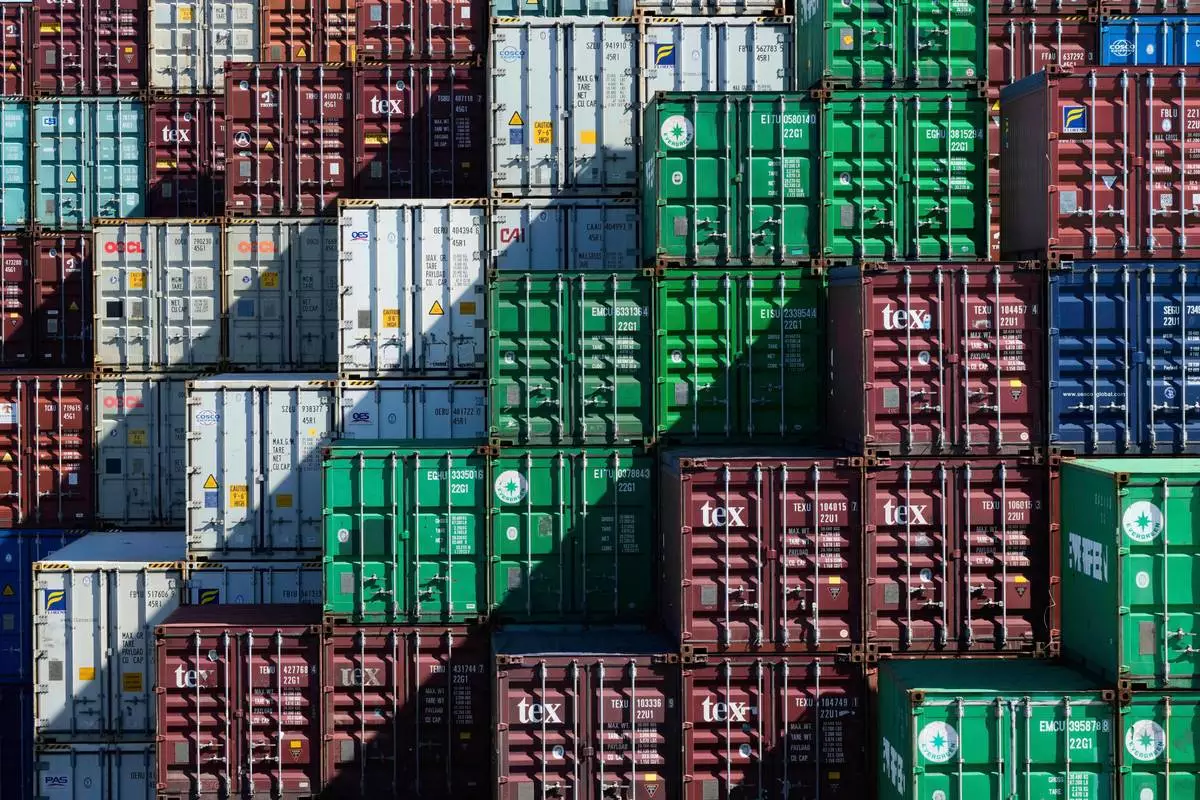
Shipping containers are stacked at Port Botany in Sydney, Australia, Monday, April 7, 2025. (AP Photo/Rick Rycroft)
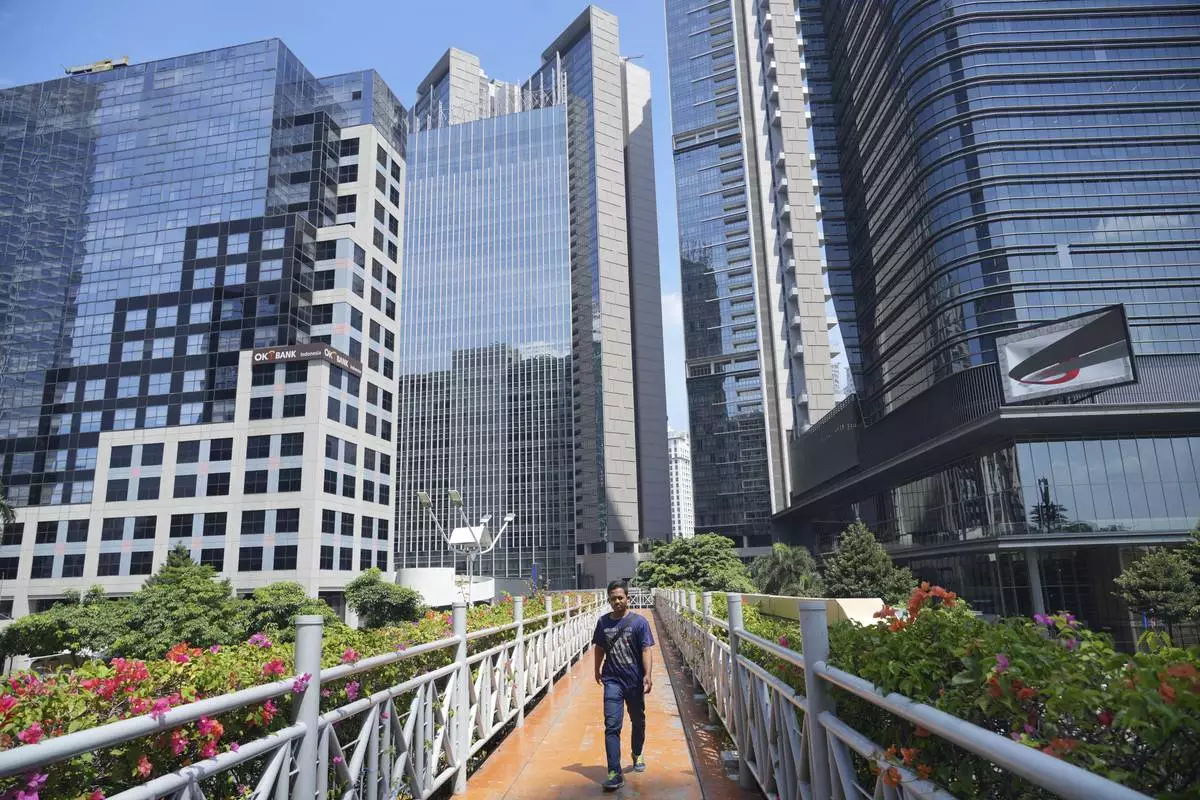
A man walks on a pedestrian bridge as tall buildings are seen in the background at the main business district in Jakarta, Indonesia, Monday, April 7, 2025. (AP Photo/Tatan Syuflana)
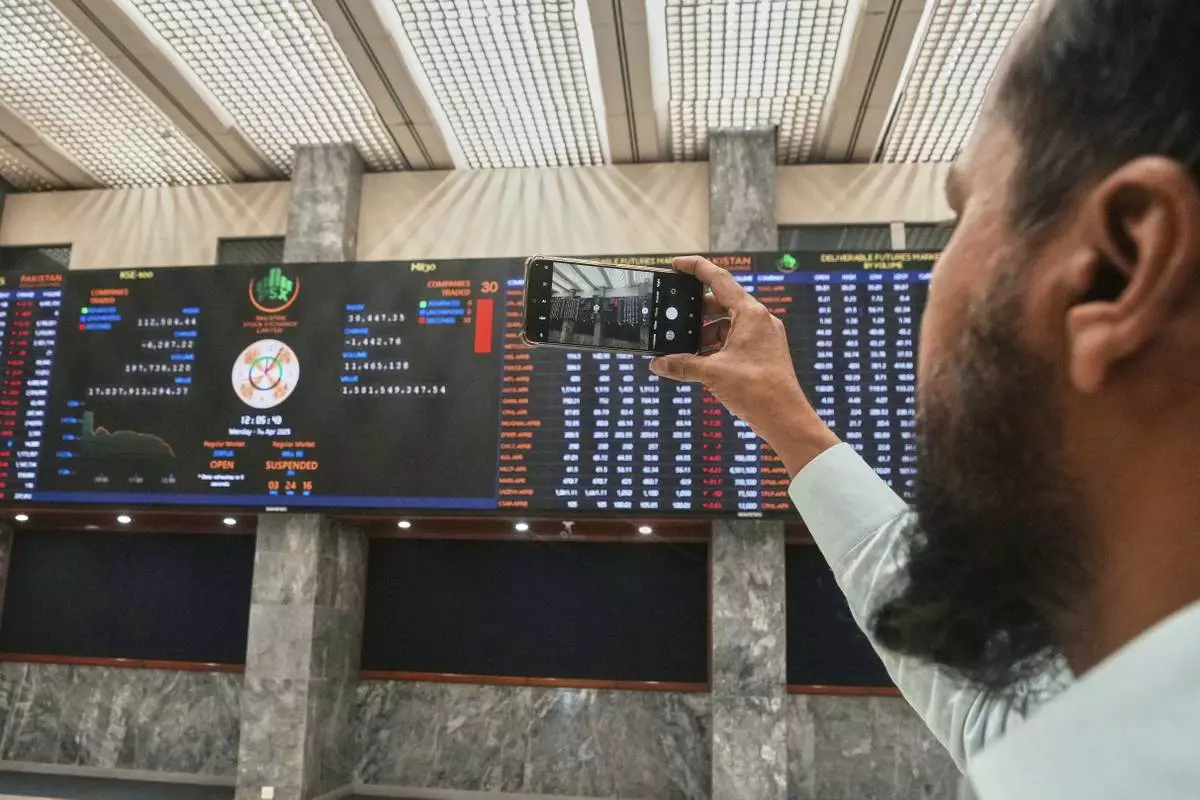
An investor takes a picture with a cell phone of indexes and benchmark 100 index at the Pakistan Stock Exchange (PSE), in Karachi, Pakistan, Monday, April 7, 2025. (AP Photo/Fareed Khan)

Emiratis are seen in the Dubai Financial Market in Dubai, United Arab Emirates, Monday, April 7, 2025. (AP Photos/Fatima Shbair)
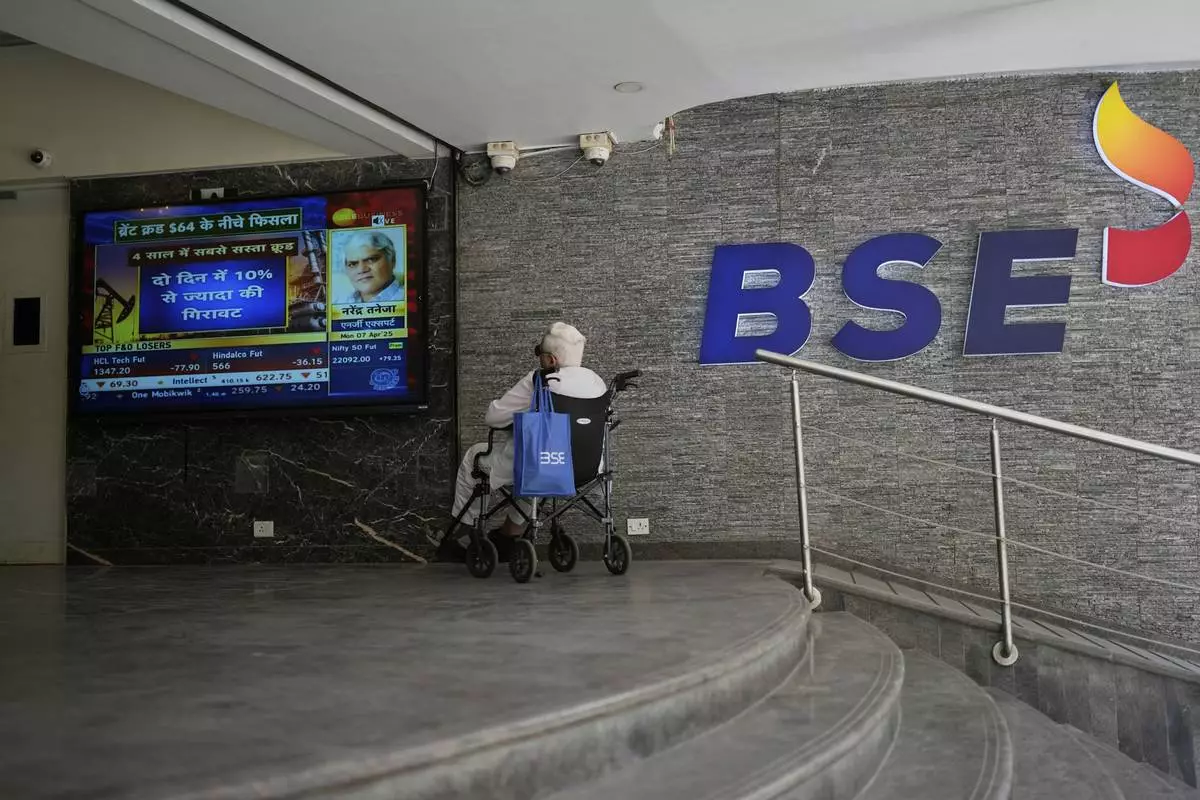
A man sits on a wheelchair and watches a live screen outside Bombay Stock Exchange (BSE) building in Mumbai, India, Monday, April 7, 2025. (AP Photo/Rajanish Kakade)
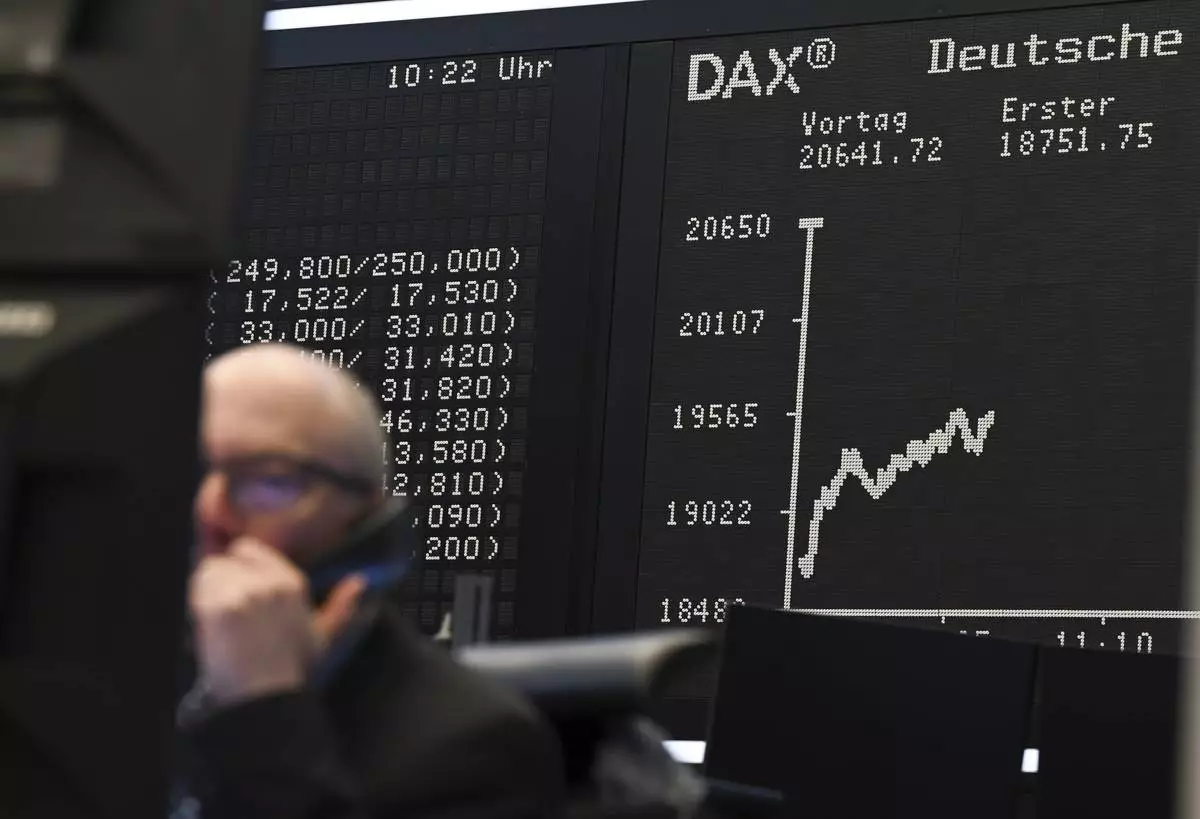
While a stock exchange trader sits in front of his monitors on the trading floor of the Frankfurt Stock Exchange, Germany, the display board with the Dax curve shows a value of less than 20,000 points. (Arne Dedert/dpa via AP)
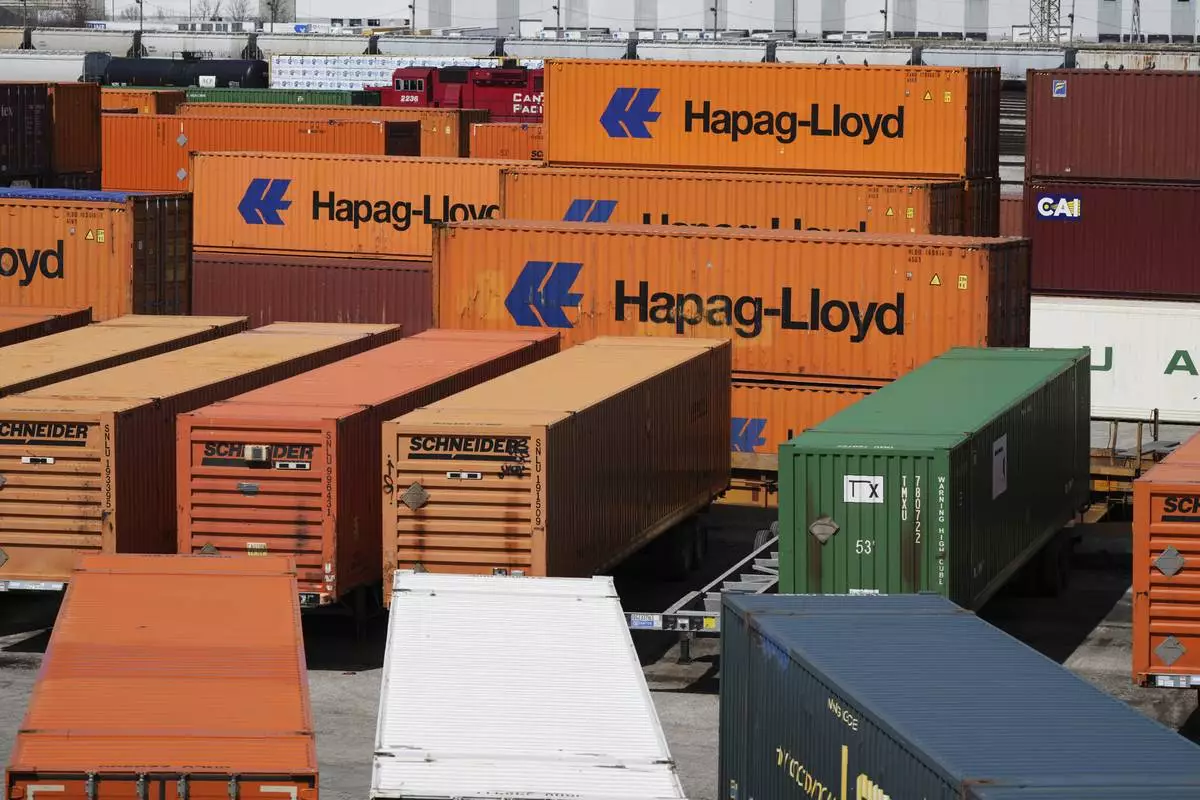
Shipping containers are stored at Bensenville intermodal terminal in Franklin Park, Ill., Sunday, April 6, 2025. (AP Photo/Nam Y. Huh)

Currency traders work near a screen showing the Korea Composite Stock Price Index (KOSPI), top left, and the foreign exchange rate between U.S. dollar and South Korean won, top center, at the foreign exchange dealing room of the KEB Hana Bank headquarters in Seoul, South Korea, Monday, April 7, 2025. (AP Photo/Ahn Young-joon)




















